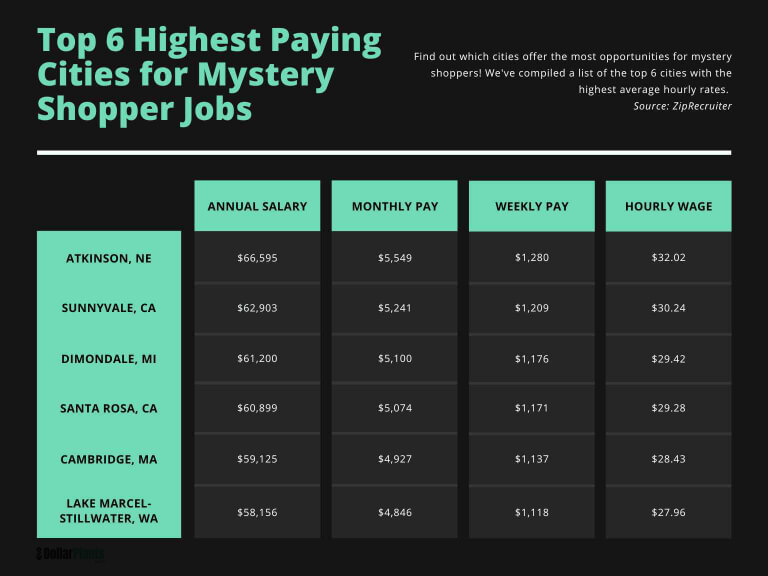Do you want to make extra cash and get paid for doing something fun?
Being a mystery shopper is a great way to do just that! Mystery shopping has been around for decades, and it’s the perfect job opportunity for those who desire flexible hours and to make money on the side.
With this type of work, you’ll visit stores, restaurants, or other businesses as required by their management teams to assess their customer service quality.
As a mystery shopper, it will be up to you to pay attention to detail so that you can provide accurate feedback on what could increase higher sales or improve customer experience.
In this blog post, we will discuss all the necessary steps to successfully become a mystery shopper and how this meaningful role can help you bring home additional income.
Table of Contents
How to become a mystery shopper?
The short answer is that the process is simpler than you might think. Many companies worldwide offer the job of a mystery shopper; all that is required from the applicant is an ability to keep an eye out for the details and deliver in-depth reports on the customer experience. Some more established companies have more stringent qualifications that require background checks and the completion of specific forms. Other companies simply ask for basic personal information and require shoppers to agree to the terms associated with mystery shopping.
Becoming a mystery shopper is a relatively straightforward process. To guarantee your success, we will divide the procedure into three moments. Let us begin:
Before becoming a mystery shopper

1. Become familiar with your local regulations and restrictions about mystery shopping, as each state has unique laws governing this activity.
2. Know the difference between an independent contractor versus an employee. It is essential to understand that mystery shoppers are usually independent contractors and therefore do not have benefits or guaranteed employment.
3. Research companies you may want to work with, such as large and small businesses in your area offering secret shopper services.
Read reviews on them and look into their payment policies and dispute resolution procedures before signing any contracts or agreements.
There are some red flags to watch out for when looking for mystery shopper jobs, as scammers often try to take advantage of people this way. According to the Federal Trade Commission, beware of any job that:
- Asks you to pay anything upfront
- Promises a list of mystery shopping job leads for a fee
- Instructs you to wire money as part of the assignment
- Have you deposited a check and then sent money back to them
If you want to know the best companies for which to become a mystery shopper, check out this post.
4. Familiarize yourself with the duties of an independent contractor by reading the Independent Contractor Agreement (ICA), which is typically required upon registration with a company to ensure that you understand the confidentiality and non-disclosure clauses, payment policies, dispute resolution policies, etc.
5. Become familiar with the reporting requirements of mystery shopping assignments and how to access necessary forms or online tools used to complete reports.
6. Check if any additional qualifications are required by your chosen company, such as a valid credit card or driver’s license.
7. Never give anyone money in exchange for mystery shopping services; legitimate companies will never charge you a fee for any reason, so be wary of websites offering “pay to play” services.
8. Practice your customer service skills to perform well during each assignment.
9. Keep track of all expenses related to your mystery shopping activities, and report them accurately on your tax forms.
10. Finally, ensure you are aware of the ethics associated with mystery shopping and stay within the rules and regulations set forth by your chosen company and any applicable laws to maintain a good reputation.
These ten steps should help ensure that you are prepared before taking on a job as a mystery shopper and will help ensure success in the business.
Becoming a mystery shopper
1. Create a profile with a reputable mystery shopping company: Many companies offer mystery shopping assignments, so it’s essential to research the ones with good reputations and reliable payments.

If you want to know the best companies for which to become a mystery shopper, check out this post.
You should create an online profile with as much information about yourself as possible, including your experience and availability.
This will increase your chances of getting picked for high-paying jobs in different locations.
2. Become familiar with the assignments: Before accepting any assignment, ensure you understand all of the details, including the shop’s objectives, how much time it will take, when it needs to be completed, and how much you will be paid.
You should also check to see if there are any out-of-pocket expenses associated with the assignment.
3. Set up a tracking system: Once you have a few assignments under your belt, you must keep track of them so you don’t miss deadlines or forget instructions.
An effective way to stay on top is by making a folder on your computer for each mystery shopping company you sign up with.
Then, include your login credentials and make notes in a column next to each company name about anything special they require – this extra step will save time scrambling later.
4. Follow up with schedulers: If you haven’t received any assignments after signing up for a few mystery shopping companies, follow up with the scheduler to ensure that your information has been received and is on file.
While schedulers may reach out to shoppers when they need someone in a particular area or for a specific assignment, this isn’t something you should count on happening. There’s no way for schedulers to call every shopper.
5. Complete assignments accurately: When you’re ready to start your first job, document it in your log.
Get the instructions for the task from the company’s site and follow them precisely—this is crucial because if the work isn’t done right or on schedule, the company will refuse it.
Doing your first assignment
1. Read the instructions and guidelines carefully: Make sure you have read all the instructions and guidelines provided by the client before beginning your assignment.
Ensure that you understand precisely what is expected of you regarding tasks, data collection, and reporting.
Pay special attention to specific details, such as the required attire for a visit or how photographs should be taken and submitted.
2. Be prepared: Arrive at the location early to familiarize yourself with the area and plan your actions accordingly.
Before beginning the assignment, ensure you have all relevant materials (such as a pen, notepad, and camera).
3. Remain focused: Stick to the task at hand and only collect data relevant to that task. Avoid being distracted by things unrelated to the assignment or engaging in unnecessary conversations with employees/customers.

4. Pay attention to detail: Collect as much data as possible, including all relevant information, such as time of day, staff attitudes, and customer interactions. Capture photos or video if necessary for evidence of your visit.
5. Submit reports promptly: Be sure to submit your report within the assigned timeframe specified by the client. Include all relevant information you gathered during your visit, and ensure you have proofread it carefully before submitting it for review.
6. Ask questions: If you have questions about the assignment or feel something is unclear, make sure to contact the client for more information. This will ensure your task is completed accurately and in a timely fashion.
7. Follow up: After submitting your report, follow up with the client to ensure they received it and determine if further action is required. This will help build trust between you and the client, which can lead to more assignments in the future.
8. Get feedback: Ask the client for feedback on your report, and use this to improve your future assignments. This will help you become a better mystery shopper and ensure that each job is completed to the highest standards.
What is mystery shopping?

Mystery Shopping is a form of market research that involves independent contractors, or Mystery Shoppers, visiting stores or restaurants to assess the customer experience.
Watch this video to learn more about mystery shopping:
Mystery Shoppers are given specific tasks to complete and prompted questions to ask.
Then, they observe the service provided, take notes, and evaluate their experiences for each task assigned based on predetermined criteria.
This service helps businesses identify areas needing improvement, assess employee performance, and gain insight into customer perceptions.
In addition, mystery Shopping can sharpen a business’s competitive edge by comparing the service quality offered between different locations.
Mystery Shopping is, therefore, instrumental in helping businesses create an outstanding customer experience.
Requirements to become a mystery shopper
To become a mystery shopper, specific requirements must be met.
First and foremost, one must have excellent observational skills to assess the customer service experience and provide detailed feedback accurately.
A good eye for detail is essential, as the feedback provided will be used by companies to improve their processes.
Another requirement is to have reliable transportation. Mystery shoppers often visit locations that may be a distance away from their homes, so personal transport is essential.
The third requirement is to possess good communication skills. While mystery shopping does not require public speaking, one must be able to clearly describe their experience in a manner that will provide helpful feedback.
A fourth requirement is computer literacy; many companies require mystery shoppers to complete surveys online before or after visiting their store locations.
Therefore one must have basic knowledge of computers and be comfortable navigating the internet.
The fifth requirement is to have a flexible schedule; mystery shoppers must be able to accommodate different working hours and assignments as they are often given on short notice.
On the other hand, one must understand the local culture and language.
For example, companies rely on mystery shoppers to provide accurate feedback about their customer service experience, which requires knowledge of the locals’ customs and expectations.
Therefore, having a good grasp of the local language is essential for providing meaningful feedback.
Finally, mystery shoppers must be able to maintain confidentiality and secrecy when completing assignments.
This means they should not reveal their identity or the purpose of their visit while conducting the assignment.
If you want to know some additional details on this topic, we recommend you watch this Youtube video of Lovely Lasean:
What are the types of mystery shopping jobs?
Businesses use several types of mystery shopping jobs to assess their customer service and operations. Every job offers a unique way to measure performance, depending on the specific nature of what is being measured and the business’s goals.
On-site mystery shopping:
On-site mystery shopping is when a secret shopper visits a business to assess its customer service and operations.
This job requires the most preparation, as the shopper needs to ensure they do not give away their true identity by acting or dressing differently than any other customers.
Typically, on-site mystery shops measure customer service, product quality, and brand experience.
They are often employed by businesses who wish to understand how their staff interacts with customers without occasions such as grand openings or promotional activities.
Telephone mystery shopping:
Telephone mystery shopping is when a secret shopper calls a business to assess their customer service. This job requires the most discretion and attention to detail, as shoppers must accurately document their experience without being detected.
Telephone mystery shops are used by businesses to measure customer satisfaction with telephone-based operations such as call centers or help desks, as well as sales performance over the phone.
They also provide valuable insights into how customers perceive a brand’s level of responsiveness, attentiveness, and politeness during interactions.
Virtual mystery shopping:
Virtual mystery shops, or internet mystery shops, are when secret shopper evaluates a brand they find online.
This is done via email, chat, or social media platforms and tests how well a business meets customers’ needs by observing its digital presence.
Virtual mystery shopping can be beneficial for any company with an online presence but is most commonly used by the travel industry, telecommunications, automotive businesses, real estate agents, and e-commerce stores.
Omnichannel mystery shopping:
Omnichannel mystery shopping encompasses more than one touchpoint in the customer journey – from internet research to a phone call to finally experiencing the service.
In addition, this job involves shoppers testing how well multiple channels work together during their evaluation.
Different businesses can benefit from omnichannel mystery shops, but they are most commonly used by industries such as banking, travel, healthcare, hoteling, real estate, and automotive.
Mystery shopping, which includes all channels, is a great way to see how customers experience different interactions with a company.
By discovering what works and doesn’t, businesses can learn what needs to be changed to improve the customer’s overall experience.
How much money can you make as a mystery shopper?
The potential earnings for Mystery Shoppers can vary widely, depending on the number of assignments they complete and the complexity of the task.
According to ZipRecruiter, the average weekly salary for a Mystery Shopper in the United States is $967 per week.
However, experienced Mystery Shoppers who take on more complex tasks may be able to earn much higher salaries.
Some reports suggest that top-earning Mystery Shoppers can make up to $4,500 monthly. In addition, some companies offer bonuses for completing specific assignments or referring other shoppers to their service.
As such, there are many opportunities to maximize earnings as a Mystery Shopper.
In addition to earning money for completing assignments, mystery shopping companies may also compensate Mystery Shoppers for the cost of their purchases.
For example, some companies will reimburse shoppers for purchasing items from stores as part of their assignment. The reimbursement amount varies based on the company and the type of assignment.

Finally, some companies offer referral bonuses to shoppers who refer other people to become Mystery Shoppers.
Overall, you can make much money as a Mystery Shopper depending on your experience level and willingness to take on challenging tasks.
However, it’s important to remember that mystery shopping is an unregulated industry with few legal protections, so it’s essential to research any company you’re considering working with beforehand.
What are the benefits of mystery shopping?
Being a mystery shopper can be a great way to make extra money and have fun while at it.
Mystery shoppers are people hired by businesses to act as undercover customers to assess the quality of their services.
As a mystery shopper, you’ll experience the best of both worlds – you’ll get paid for your time shopping and evaluating the customer service and product quality, all while enjoying yourself with free products or discounts that come along with the job.
Mystery shopping comes with many benefits.
First, it offers flexible work hours and locations; this makes it an ideal job for busy professionals, students, or stay-at-home parents who need extra income but don’t have the time to commit to a full-time job.

It is also a great way to get free products or discounts on various items, such as groceries and clothing.
Lastly, mystery shopping allows you to have your voice heard; providing feedback about customer service, and product quality can help ensure that businesses are giving their customers the best possible experience.
Overall, being a mystery shopper can be rewarding both financially and personally.
By becoming a mystery shopper, you’ll make money while also helping companies improve their services – it’s a win-win situation!
10 tips for succeeding as a mystery shopper

1. Make a plan: Make a plan before you start mystery shopping. This will help you stay organized and know what to do.
2. Stay organized: Follow the rules carefully when mystery shopping, so you don’t get in trouble.
3. Stick to the rules: Be patient and wait for businesses to get back to you about your application or purchase.
4. Be patient: Take notes while mystery shopping to remember what happened.
5. Follow up with businesses: After you’ve completed a mystery shopping job, it can be helpful to follow up with the business.
This will show them that you are serious about the job and will make them more likely to hire you again in the future.
6. Take notes: Double-check everything you do while mystery shopping to ensure it is accurate.
7. Pay attention to detail: When you’re mystery shopping, it’s essential to pay attention to detail. This means checking everything you do to make sure it’s accurate. This includes taking notes, so you remember what happened.
8. Be professional: Be professional when interacting with businesses, even if they are rude to you.
9. Expect some rejections: Expect some rejections when applying for jobs or making purchases as a mystery shopper, but keep them from stopping you!
10. Have fun!: Have fun while doing your job, and enjoy getting to know new places!


